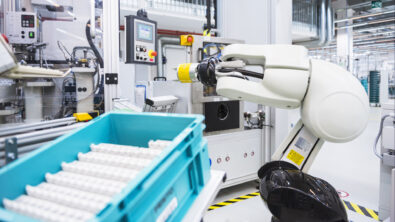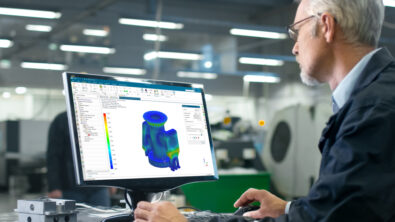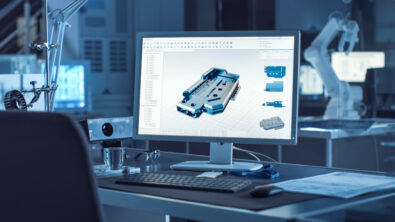Build more innovative food and beverage machinery for process and packaging with advanced machine engineering solutions

Food and beverage (F&B) machinery builders have a lot on their metaphorical plates. As you attempt to manufacture innovative machines for different processes and packaging that easily integrate into any customer’s manufacturing landscape, customer demands change, sustainability regulations strengthen and the industry continues to evolve.
Your ticket to navigating this complexity lies in digitalization. Advanced machine engineering for food & beverage is a three-pillared approach aimed at helping machine builders design, manufacture and commission F&B machinery that meets customer specifications, compliance requirements and delivery deadlines. Check out the infographic below for a high-level synopsis of this approach.
Three pillars of advanced machine engineering for food and beverage machinery
Food & beverage manufacturers want a product that meets their individual needs. They want it with traceability and sustainability, and they want it fast. If you can’t deliver what they want, they’ll look to someone who can get them what they need within their timeline.
With this holistic approach, you can deliver the adaptable, smart and connected machines your customers demand. The road to success consists of flexible and modular machines designed with cutting-edge software and built with data-enabled services.
Design flexibility and modularization
Flexible and modular designs make delivering food and beverage machinery more efficient and cost-effective. Entirely customized machines can lead to design issues, multiple iterations and delays. A flexible and modular approach allows machine builders to deliver machines that maximize reuse to meet product-variant needs.
Development time shrinks significantly with preconfigured tools, an integrated framework and libraries that allow many tasks to be automated. The result is a flexible machine and line design capable of being integrated within an entire plant.
Next-generation machine design
Next-generation machine design unlocks the ability to integrate design functions like mechanical, electrical, software and automation with customer requirements. Along with domains, you can connect and integrate processes like never before, too. Bid management, concept design, project planning and product quality can all be integrated into a single system.
You will leverage that new-found connectivity to deliver more machines—faster. You can further speed and optimize your processes with simulation-driven design functionality, simulation results that can be easily shared thanks to newly connected domains and processes.
Data-enabled services
Data and Industrial Internet of Things (IIoT) devices can capture and transmit valuable data generated by individual machines, processes or entire lines. These embedded sensors enhance flexibility, traceability and efficiency, and they can even open up new avenues for product and product development improvements.
You can offer customers a lifetime package of remote service capabilities like predictive maintenance and reliability optimization. With the recently connected domains and processes, all domains and partners have visibility to these service capabilities, ensuring the best possible joint understanding of how the machine is used and how it’s performing. Additionally, the combination of data and simulation that data-enabled services provide allows you to test ergonomics, human-robot interactions and much more in a virtual environment running on data fed into it from the real-life floor.
Conclusion
Food and beverage machinery manufacturers need to meet the needs of their increasingly demanding customers. Your customers’ need for innovative machines that easily integrate into their existing ecosystem has made existing methods and solutions obsolete.
To manufacture advanced and compliant machines quickly, you must adopt the advanced machine engineering solution. With this framework, you have the process flexibility to accommodate customer personalization requests, the process traceability to achieve first-time-right and the modern simulation and IIoT functionality to predict, test and optimize your processes continuously.


